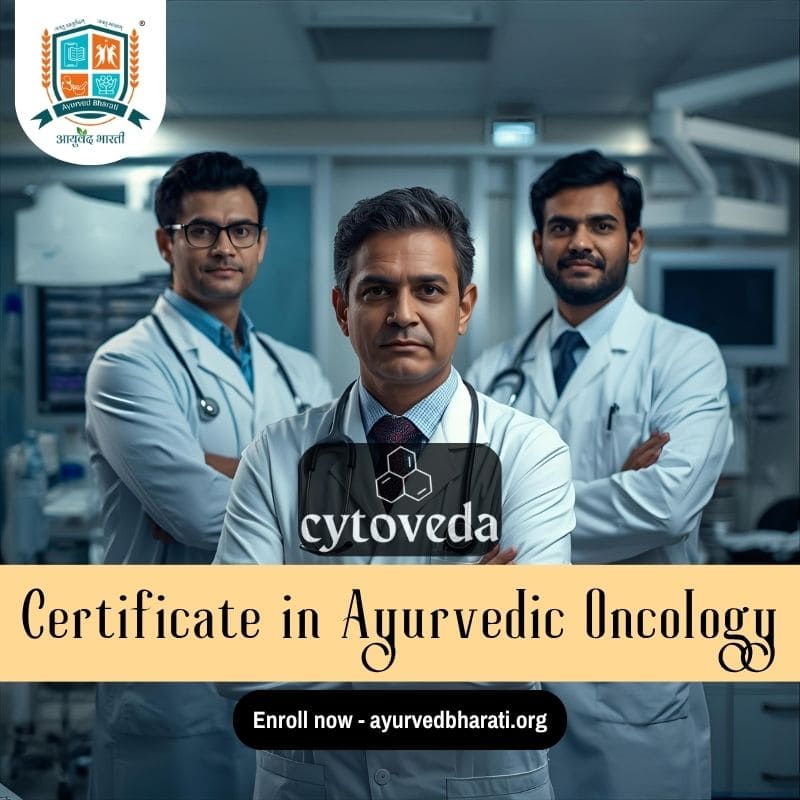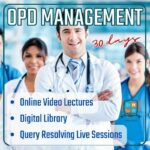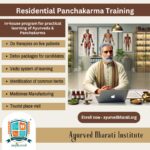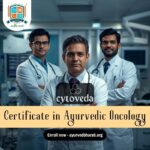The Certificate in Ayurvedic Oncology – Clinical Practice Program is a 3-level, fully online, clinical training designed for medical interns and graduates (BAMS, BHMS, BUMS, MBBS) who want to safely and effectively integrate Ayurveda into oncology practice. This program focuses on real-world OPD skills, prescription writing, and integrative management plans while respecting standard modern oncological care.
It is a self-paced but time-bounded course with structured levels:
- Level 1 – Basic (30 days), Fee – ₹4990
- Level 2 – Intermediate (+60 days), Fee – ₹4990 – prerequisite: Basic
- Level 3 – Advanced (+90 days), Fee – ₹4990 – prerequisite: Intermediate
- Course Language –
- Reading materials – English
- Video lectures – Hindi
- Course Fee – ₹ 4990 for BASIC level. The learner will be promoted to next level after paying the next level fees
- Course Validity – Unlimited, you will have access to the course material for the life time.
- Exam & Certificate – After completion of course and successfully passing the final online exam, you will be awarded a certificate of completion (e-certificate and hard copy). This course is being offered by Ayurved Bharati Institute in technical collaboration with Cytoveda team of Ayurvite Wellness Private Limited. The course is not affiliated or recognised by any university or Government authority. This course is aimed to make you skilled and sharing knowledge.
Important: This course teaches Ayurveda as an integrative / adjunct approach in oncology. It does not replace standard cancer care (surgery, chemotherapy, radiotherapy, targeted or immunotherapy) and does not confer any additional legal qualification. Participants must always work within the scope of their respective councils and in coordination with oncologists.
Who This Course Is For
This clinical program is ideal for:
- BAMS, BHMS, BUMS doctors who want a structured, oncology-oriented Ayurveda framework.
- MBBS doctors interested in evidence-informed integrative oncology and Ayurvedic support.
- Interns and fresh graduates who want to start oncology-supportive OPD services under guidance.
- Practitioners already seeing cancer patients for pain, fatigue, digestion, immunity, QoL and looking for safer, protocol-based Ayurvedic support.
Key Features of the Certificate in Ayurvedic Oncology
- 3 stackable levels – Basic (30 days), Intermediate (+60 days), Advanced (+90 days)
- Pre-recorded HD video lectures for flexible learning within each level
- Downloadable PDFs – slides, notes, and concise research summaries
- Case-based assignments and prescription-writing drills
- Level-wise MCQ final exams (no negative marking)
- Ayurveda + Modern Oncology fusion – clear boundaries & realistic outcomes
- Focus on Ayurvedic formulations (taught with indications, rationale and safety)
- Step-by-step framework to build Ayurvedic Oncology OPD protocols
What You Will Learn – Level-wise Outcomes
Level 1 – Basic (30 Days): Foundations of Integrative Oncology
By the end of Level 1, you will be able to:
- Understand fundamental concepts of cancer – neoplasia, hallmarks of cancer, basic tumor biology.
- Explain staging, basic investigations and performance status (ECOG / Karnofsky) in simple clinical language.
- Map core Ayurvedic concepts (doṣa, dhātu, mala, srotas, agni, ama, ojas, rasayana) to oncology scenarios.
- Understand the logic and realistic scope of Ayurvedic support in cancer – what is possible, what is not.
- Know the broad actions and indications of selected proprietary and classical formulations relevant to oncology-supportive care.
- Take a focused history and do a basic clinical assessment of suspected/confirmed cancer patients.
- Communicate appropriately with oncologists and document integrative plans ethically.
Level 2 – Intermediate (+60 Days): Disease-wise & Side-effect Management
By the end of Level 2, you will:
- Understand disease-wise modern basics for common solid tumors and blood cancers.
- Correlate each cancer with Ayurvedic roga-saṅgraha and samprapti (e.g., Arbuda, Granthi, Gulma, Vidradhī, Raktapitta, etc.).
- Draft symptom-focused and organ-supportive Ayurvedic plans using the taught medicines.
- Manage common chemo/RT side-effects (nausea, mucositis, diarrhea/constipation, neuropathy, fatigue, insomnia) with safe Ayurvedic support.
- Prepare patient education leaflets and document integrative care clearly.
Level 3 – Advanced (+90 Days): Protocol Writing & Ayurvedic Oncology OPD Setup
By the end of Level 3, you will be able to:
- Prepare complete integrative management plans for major cancers (breast, cervix, colorectal, lung, oral, etc.) considering stage and performance status.
- Tailor your proprietary and classical medicines to different phases – curative, adjuvant, metastatic, palliative.
- Design standard protocol templates and clinical documentation formats for an Ayurvedic Oncology OPD.
- Handle complex symptoms (pain, ascites, breathlessness, cachexia, insomnia, depression) within an integrative, multidisciplinary framework.
- Critically read basic research on Ayurveda in oncology and plan small practice-based audits.
- Plan the workflow of an Ayurvedic Oncology clinic with pharmacy, counselling and referral integration.
Teaching Methodology
- Pre-recorded HD video lectures – you can watch and re-watch within your course duration.
- Downloadable PDFs – lecture slides, notes, and concise research pointers.
- Case-based assignments – practical, OPD-style case vignettes with prescription design.
- MCQ-based final exams at each level (no negative marking, single best answer).
- Structured progression from foundational understanding to disease-wise planning and full protocol writing.
Every component is designed to make you clinic-ready – able to think clearly in both modern oncology language and Ayurvedic samprapti, and to design safe, rational, integrative plans using the taught medicines.
Certification
- On successful completion of each level (assignments + MCQ exam), you become eligible for a Level Completion Certificate (digital).
- After completing all three levels – Basic, Intermediate and Advanced – you will have completed the full “Certificate in Ayurvedic Oncology”.
This is a skill-building and knowledge-upgradation program. It does not replace formal degrees like MD, DM, DNB, MCh, or any statutory qualification. You must continue to follow your respective council and national regulations while applying this knowledge.
How This Course Helps Your Clinical Practice
- Gives you a clear framework to decide when, how and how much to intervene with Ayurveda in cancer cases.
- Helps you move from random prescriptions to structured, stage-appropriate protocols.
- Improves your ability to talk confidently with oncologists using correct modern terminology.
- Teaches you to use your proprietary and classical formulations with evidence-informed rationale and safety.
- Guides you to design Ayurvedic Oncology OPD templates, documentation formats and patient education tools.
- Supports you in building a long-term, ethical, integrative oncology practice focused on quality of life, symptom relief and survivorship.
Frequently Asked Questions (FAQs)
1. Who is eligible for the Certificate in Ayurvedic Oncology (Clinical)?
Eligible learners: BAMS, BHMS, BUMS, MBBS – interns and graduates. The course is designed for doctors and final-year interns with a medical background.
2. Is this course completely online?
Yes. The entire program is fully online with pre-recorded HD video lectures and downloadable study material. You can learn at your own pace within the allotted duration of each level.
3. How long do I get to complete each level?
- Level 1 – Basic: 30 days access
- Level 2 – Intermediate: +60 days (after Basic)
- Level 3 – Advanced: +90 days (after Intermediate)
You must complete the lessons, assignments and MCQ exam within the respective time frame.
4. Are there exams and assignments?
Yes. Each level has:
- Case-based assignments to apply concepts clinically.
- Level-wise MCQ final exam (no negative marking). Passing criteria will be clearly mentioned in your course dashboard.
5. Will I learn exact prescriptions and protocols?
Yes. You will learn model prescriptions, case templates and symptom-wise protocols using the taught proprietary and classical formulations. You will also learn how to modify these according to stage, performance status and symptom clusters.
6. Is this course a replacement for DM/DNB Oncology or other formal degrees?
No. This is a certificate course for clinical skill enhancement in integrative Ayurvedic oncology. It does not replace any formal MD/DM/DNB/MCh or statutory qualification. You must always work within your legal scope and in coordination with qualified oncologists.
7. Can I start an Ayurvedic Oncology OPD after this course?
This program will give you structured knowledge, clinical frameworks and protocol templates to support oncology patients with Ayurveda in an integrative manner. Starting or branding an OPD must always follow your local regulations, institutional policies, and your own professional judgement.
8. How do I enroll?
Click on the “Enroll Now” button on this page, complete the payment, and you will receive login details and access instructions on your registered email/WhatsApp.
Ready to Upgrade Your Clinical Practice in Integrative Oncology?
If you are a BAMS, BHMS, BUMS or MBBS doctor who wants a practical, protocol-based, ethically sound approach to Ayurvedic oncology, this Certificate in Ayurvedic Oncology – Clinical Practice Program is crafted for you.
Enroll now and start building safe, structured, integrative cancer-support protocols in your practice.
Detailed Course Curriculum – Certificate in Ayurvedic Oncology
A. Learning Outcomes
By the end of Basic level, the learner should be able to:
- Understand fundamental concepts of cancer (modern) – cell cycle, carcinogenesis, staging.
- Map basic Ayurveda concepts (doṣa, dhātu, agni, ojas, ama, rasayana) to the oncology context.
- Know the logic of Ayurvedic support in cancer – what is realistic, what is not.
- Know the broad actions and indications of your proprietary and classical medicines list (not yet disease-wise protocols).
- Take a focused history and do basic examination of suspected / confirmed cancer patients and communicate with oncologists.
B. Module Plan
- Module 1 – Introduction to Oncology & Integrative Approach
- Lesson 1: What is Cancer? – Neoplasia, benign vs malignant, hallmarks of cancer
- Lesson 2: Basic Tumor Biology – cell cycle, apoptosis, angiogenesis, metastasis
- Lesson 3: Overview of Modern Cancer Care – surgery, chemo, radiotherapy, targeted, immunotherapy
- Lesson 4: Integrative Oncology – definition, evidence levels, role of Ayurveda
- Module 2 – Ayurvedic Foundations Relevant to Oncology
- Lesson 5: Doṣa, Dhātu, Mala, Srotas concepts in chronic and malignant disorders
- Lesson 6: Ama, Agni, Ojas – their role in carcinogenesis & immune surveillance (conceptual)
- Lesson 7: Arbuda & Granthi in classical texts – definitions, bheda, prognostic clues
- Lesson 8: Kriyakāla and “precancerous” states in Ayurveda
- Lesson 9: Rasayana – concept, indications, limits in established malignancy
- Module 3 – Basics of Modern Diagnosis & Staging
- Lesson 10: Clinical warning signs – CAUTION U, red flags
- Lesson 11: Role of imaging – X-ray, USG, CT, MRI, PET-CT (basic idea, not radiology teaching)
- Lesson 12: Biopsy, cytology, immunohistochemistry, staging systems (TNM)
- Lesson 13: Performance status (ECOG/Karnofsky) and why it matters for integrative planning
- Lesson 14: Reading an oncology report – how a BAMS/BHMS/BUMS doctor should interpret the key data
- Module 4 – Introduction to Ayurvedic Formulations & Pharmacology
- Lesson 15: Innovative Treatment Solutions at Cytoveda
- Lesson 16: Core GI and Systemic Modulators in Oncology
- Lesson 17: Hepatoprotective, Immunometabolic and Detox Formulas
- Lesson 18: System-wise Rasayana and Ojovardhak Formulas in Cancer Patients
- Lesson 19: Edema, Pain and Inflammatory Terrain Management
- Lesson 20: Respiratory and Cardiometabolic Support in Oncology
- Lesson 21: Herb–Drug Interaction & Safety with Classical Medicines
- Module 5 – Clinical Skills & Ethics in Ayurvedic Oncology
- Lesson 22: Taking history in cancer patients – pain, appetite, bowel/bladder, weight loss, performance status
- Lesson 23: Communication & consent – explaining integrative plan, documenting properly
- Lesson 24: Ethics: never promising cure, respecting oncologist plan, avoiding treatment delays
- Lesson 25: Building referral relationships with oncologists and palliative care teams
- Lesson 26: Case vignettes – when Ayurvedic care is appropriate / when not to intervene
C. Basic Level Final Exam (MCQ type)
- Format: 50 MCQs, single best answer
- Marks: 1 mark each, no negative marking, passing at 50%.
A. Learning Outcomes
By the end of Intermediate level, the learner should:
- Understand disease-wise modern basics for common solid tumors and blood cancers.
- Correlate them with Ayurvedic concepts.
- Draft symptom-focused and organ-supportive Ayurvedic plans.
- Manage common side-effects of chemo/RT with safe Ayurvedic support.
- Document integrative care clearly and communicate with other specialists.
B. Module Plan
- Module 1 – Solid Tumors I: Breast & Gynecologic Cancers
- Lesson 27: Breast Cancer – modern overview (risk factors, staging, standard treatments)
- Lesson 28: Breast CA – Ayurvedic correlations (Stana Arbuda, Granthi), doṣa/dhātu mapping
- Lesson 29: Integrative management framework for breast CA
- Lesson 30: Cervical Cancer – modern overview
- Lesson 31: Cervical CA – Ayurvedic view (yoni vyapad, arbuda, rakta-dushti)
- Lesson 32: Integrative management plan (symptom relief, vaginal discharge, bleeding, pelvic pain).
- Lesson 33: Ovarian & Endometrial Cancers – brief modern + Ayurvedic view + outlines of supportive protocols.
- Module 2 – Solid Tumors II: GI & Hepato-Pancreato-Biliary
- Lesson 34: Oral cavity & oropharyngeal cancers – modern view, tobacco-related, staging
- Lesson 35: Oral cancers – Ayurvedic view (mukha arbuda, vrana, etc.) + local & systemic plans
- Lesson 36: Esophageal & Gastric cancers
- Lesson 37: Colorectal & Anal cancers
- Lesson 38: Hepatocellular carcinoma & cholangiocarcinoma
- Lesson 39: Pancreatic cancers
- Lesson 40: Organ-supportive Ayurvedic plans for GI cancers
- Module 3 – Solid Tumors III: Lung, Head & Neck, GU, Others
- Lesson 41: Lung cancers – modern overview
- Lesson 42: Lung CA – Ayurvedic view (Shwasahar, Kasa, Pranavaha srotas)
- Lesson 43: Supportive care for dyspnea, cough, cachexia
- Lesson 44: Prostate & Bladder cancers
- Lesson 45: Kidney cancers & testicular cancers
- Lesson 46: Head & neck region cancers (excluding oral) – nasopharynx, larynx, etc.
- Lesson 47: Symptom-wise plans: LUTS, bone pain, edema, fatigue, insomnia.
- Module 4 – Hematologic Malignancies
- Lesson 48: Acute & chronic leukemias – modern overview
- Lesson 49: Lymphomas & multiple myeloma – basics
- Lesson 50: Hematologic malignancies – Ayurvedic correlation (Raktarbuda, Raktapitta, Pandu, Plihodara, etc.)
- Lesson 51: Supportive Ayurvedic care during high-intensity chemo
- Module 5 – Managing Treatment-Related Side-Effects
- Lesson 52: Nausea, vomiting – modern antiemetics + Ayurvedic support
- Lesson 53: Mucositis & stomatitis
- Lesson 54: Diarrhea, constipation, malabsorption
- Lesson 55: Neuropathy, myalgia, arthralgia
- Lesson 56: Fatigue, insomnia, mood issues
- Lesson 57: Basic palliative care concepts.
C. Intermediate Level Final Exam (MCQ type)
- Format: 50 MCQs (single best answer)
- Marks: 1 mark each, no negative marking, passing at 50%
A. Learning Outcomes
By the end of Advanced level, the learner should:
- Prepare complete integrative management plans for major cancers with staging & performance status in mind.
- Tailor your proprietary/classical medicines to specific scenarios (curative treatment phase, adjuvant, metastatic, palliative).
- Design clinical documentation formats and simple practice protocols for an Ayurvedic Oncology OPD.
- Critically read basic research on Ayurveda & oncology and design small practice-based projects/audits.
- Handle complex symptoms in advanced disease with multidisciplinary palliative approach.
B. Module Plan
- Module 1 – Deep Dive: Breast & Gynecologic Cancers
- Lesson 58: Stage-wise breast CA management – curative vs metastatic, hormonal vs HER2+ vs triple negative (modern)
- Lesson 59: Detailed integrative plan – early stage (post-surgery & adjuvant therapy)
- Lesson 60: Detailed integrative plan – metastatic breast CA & advanced symptoms
- Lesson 61: Cervical cancer – detailed stage-wise modern management & post-RT complications
- Lesson 62: Integrative protocols for cervix CA – discharge, bleeding, pelvic pain, RT damage.
- Lesson 63: Ovarian & endometrial cancers – protocol outlines & follow-up planning.
- Module 2 – Deep Dive: GI & Hepato-Pancreato-Biliary Cancers
- Lesson 64: Colorectal CA – stage-wise management & survivorship issues (stoma, diarrhea, malabsorption)
- Lesson 65: GI cancers – specific integrative plans (upper GI vs lower GI focus)
- Lesson 66: Hepatocellular CA & cirrhosis background – modern & Ayurvedic view
- Lesson 67: Integrative hepatoprotective and ascites management plan
- Lesson 68: Pancreatic cancer – pain, malabsorption, cachexia focused support.
- Module 3 – Deep Dive: Lung, H&N, GU & Brain
- Lesson 69: Lung CA – stage-wise, targeted/immunotherapy issues, RT pneumonitis
- Lesson 70: Integrative lung CA protocols – breathlessness, cough, anxiety, cachexia
- Lesson 71: Head & neck cancers – complex local care (wounds, trismus, speech/swallow issues)
- Lesson 72: Prostate + bladder + kidney + testicular CA – integrative plans focused on LUTS, bone mets, fatigue.
- Lesson 73: Brain tumors – seizures, raised ICP, cognitive issues, limitations & realistic goals of Ayurveda.
- Module 4 – Hematologic Cancers, Pediatric Cancers & Survivorship
- Lesson 74: Detailed protocols for leukemia & lymphoma support – neutropenia, mucositis, GI issues, growth & development in pediatrics.
- Lesson 75: Multiple myeloma – bone pain, fractures, anemia, renal involvement.
- Lesson 76: Pediatric solid tumors – Wilms, neuroblastoma, etc. – only supportive role, ethical concerns.
- Lesson 77: Survivorship & recurrence prevention – exercise, diet, Rasayana blocks using your medicines.
- Lesson 78: Long-term toxicities – cardiomyopathy, neuropathy, endocrine dysfunction – integrative ideas.
- Module 5 – Protocol Writing Using Your Formulary
- Lesson 79: How to construct a standard protocol template
- Lesson 80: Mapping your products cancer-wise
- Lesson 81: Protocols for common symptoms across cancers
- Lesson 82: Palliative care OPD protocols – opioid co-use, constipation prevention, delirium recognition.
- Module 6 – Research, Documentation & Practice Setup
- Lesson 83: Basics of clinical research in integrative oncology
- Lesson 84: Reading a research paper on Ayurveda in cancer – critical appraisal basics.
- Lesson 85: Designing simple practice-based audits in your OPD – symptom score tracking, QoL questionnaires, lab trends.
- Lesson 86: Documentation standards & medico-legal considerations in Ayurvedic oncology practice.
- Lesson 87: Designing your Ayurvedic Oncology Clinic
- Lesson 88: Final integrated case discussions (2–3 complex cases with full protocol building).
C. Advanced Level Final Exam (MCQ type)
- Format: 100 MCQs
- Marks: 1 mark each, no negative marking, passing 50%.








